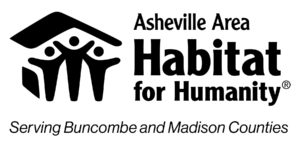AmeriCorps Stories: Lauren Rozman
“When I told my family and friends I was starting an AmeriCorps position, their response was mostly “Ummmmm, why?” What they thought was taking a step backward for me, ended up being a huge leap forward.”
“When I told my family and friends I was starting an AmeriCorps position, their response was mostly “Ummmmm, why?” What they thought was taking a step backward for me, ended up being a huge leap forward.”
A reflection by AmeriCorps VISTA member Krysta Osweiler, who works in Homeowner Services.
“The more I’ve had the opportunity to speak with different members of the community (over 200 individuals in just one quarter!), the more I’ve seen the ways that the entire issue of affordable housing affects far more people than I ever thought it would. I came into my VISTA role knowing that there was a huge need, but as I’ve spent time talking with different community members, and really listening to their stories, I’ve seen many of the ways that housing can, and often does, divide people. Almost into the “haves” and “have not’s”. For some, renting is a way of life. For others, it’s all they can afford. For even more, they haven’t once considered that there may be another option.
Each of my grandparents owned their homes, and my parents have owned a home since I was baby. I have never once considered that homeownership might be out of reach for me. But that’s not how it is for everyone, and depending on where you live, monthly mortgage payments could cost far more than rent would. Up until now, I’ve really seen the question of homeownership as being purely a matter of finances, without fully appreciating that there can often be a whole lot more at play in the decision than just money.
One of my most meaningful experiences was completely unexpected. I reached out to our local community college, wondering how I could best connect with their ESL students. Imagine my surprise when the response was an invitation to speak with their English conversation class! There were 9 class members on the day of my visit, each with varying levels of English proficiency. The facilitator had prepared a list of questions to discuss, specifically focused on housing, and it was pretty eye-opening to hear their responses. Some were interested in a house, but only after having children, once they’d really “need” the extra space. Others lived with extended family, and desperately wanted to be in a place of their own; but their cultures were the kind where multiple generations lived together, and not having other family members in the home would never be an option for them. One came from a city where literally no one could afford to buy a home of their own, so until this conversation, it had never once crossed his mind that people might do that.
Housing and “home” is something we all see very differently, depending on where we came from and what our point of reference is. I knew that if you always rented, and your parents always rented, and your grandparents always rented, that you probably wouldn’t recognize homeownership as an option for you. But I didn’t fully appreciate the ways that your culture could play into that, or how it can even go so far as to dictate your housing choices for you. Many of these international students had always lived with extended family, and really wanted to enjoy their apartments here, and the space to themselves. One even said that as long as they were in a small apartment, no one else would come live with them, but if they had a house, other family members would definitely be living there, too. That completely took away any motivation for them to purchase a house down the road. When my husband and I first bought a house, that wasn’t even part of what we considered. We wanted to have space for our family members to be able to visit. But for these students, having that space would mean something completely different. It wouldn’t have been space for visitors, it would have been space for long-term guests that wouldn’t necessarily leave.
These conversations have been an important part of sharing information about Habitat with our community. They’ve also been important as a way to educate people on both sides of the table. Not only did these students need to hear that homeownership is a possibility, I needed to hear what shaped their thoughts on the process. We each have a unique perspective, and every single one of those perspectives is valid. Until we really listen to the people on the “other” side of the table, we won’t be able to recognize how different our thoughts might be. Much of my time has been spent educating the community at-large about Habitat and the services we provide. In doing so, I’ve learned from community members themselves, and for that, I am grateful.”
By Zoe Trout & Beth Russo
We love our business community!
Local businesses know that our entire community is stronger when residents – and employees – have decent and affordable housing. We see this throughout the year at Asheville Area Habitat for Humanity, but never more so than when building the Business Bungalow.
The fourth Business Bungalow started construction last week, and is a house sponsored by local companies of all sizes. Longtime supporters Eaton Corporation launched this year’s Business Bungalow with a $20,000 challenge gift. In their 11th year of sponsorship, Eaton made this gift and encouraged other businesses to get involved at any level. Business Bungalow 4 has raised more than $52,000 so far, with over 40 businesses participating!
This house sponsorship includes all size businesses (from very small to very large), who band together to help build an affordable, energy efficient home. Restaurants like Copper Crown give a percentage of their proceeds from one evening of sales, while Rezaz is running specials throughout the month of March to support this build.
Other companies, like Blue Ridge Orthodontics, use their sponsorship support to bring their employees from the office out to a Habitat jobsite to share a team building experience volunteering to build this house.
The financial support that local businesses provide – whether as a Housing Champion, Blueprint Sponsor or at a higher level – helps make Habitat homes affordable. Every dollar adds up to an affordable Green Built home that a deserving family will purchase. Asheville Habitat is proud to collaborate with so many local businesses to make affordable homeownership within reach for more local families. Click here to see all of our wonderful sponsors! We are especially excited that this year’s Business Bungalow is the first townhome built in our 36-year history. Now offering a mix of housing types, this is another way Habitat is working to create even more affordable homeownership opportunities for folks that live and work in Buncombe County.
If you are interested in joining this diverse group of businesses please contact Beth Russo at brusso@ashevillehabitat.org for more information. Thank you!
By Zoe Trout
More than 100 Habitat friends and supporters recently gathered at Givens Estates for a 5-Home Dedication. Typically held on the jobsite, we take this celebratory event indoors in February and serve a warm chili lunch. Given’s graciously donated the space this year and their amazing culinary team prepared a delicious meal. We are grateful for their ongoing partnership and this new form of support.
With five homes being dedicated, the program was filled with words of joy from all different voices – faith communities, businesses, and individuals. The event started with music from Aaron Price, Music Director at West Asheville Presbyterian Church—a longtime partner in the Presbyterian Methodist House. Their annual benefit concert for the Presbyterian Methodist House will take place on February 24 (reschedule from January 20). Lynn Bledsoe, Chaplin for Givens Estates did the invocation for the event and recited the E.E. Cummings poem, “I thank You God for most this amazing day”.
I thank You God for most this amazing
day: for the leaping greenly spirits of trees
and a blue true dream of sky; and for everything
which is natural which is infinite which is yes
We celebrated more “yeses” with the 35th Anniversary House presented by AvL Technologies. On behalf of the company, Krystal Dredge presented a ceremonial key to Celia Ramirez, who closed on her home in Arden in December. Celia thanked everyone for their support– the sponsors of her house, her employer Diamond Brand, and all the volunteers that worked on her home. She choked up a little when describing what it meant for her and her son to celebrate Christmas and the New Year in their new home.
Robyn Mondin of sponsoring business Wells Fargo presented a ceremonial key to Mary Leake, who purchased the Voluntourism House in January. This home celebrates the many visiting groups that come to Asheville and support Habitat’s work financially and through volunteer service. “My favorite part of the Habitat process was working on the jobsite building my house and my neighbor’s homes,” she noted.
Merritt Moseley, a volunteer at Asbury Memorial United Methodist Church presented a key to Shaketia Simpson and her two children, who had just closed on their home (the Presbyterian-Methodist House 27) the day before! Merritt has been volunteering with Habitat for 10+ years and coordinates volunteers from Asbury UMC annually for the Presbyterian Methodist House, or as he calls it – the Methodist Presbyterian House!
Tyerecka Howell will purchase the 20th Interfaith House in March. There with her older son, she told the crowd about her struggles to complete her sweat equity after the pre-term birth of her youngest son a few months before. But with the support of Habitat and her family, she was able to complete most of her hours while on maternity leave. Presenting Tyerecka with her key was Nancy Sehested the pastor at Circle of Mercy, one of the Interfaith House congregations. She recapped her experience of participated in our “Clergy Build” day on the jobsite last year, noting how invigorating it was to build together with people of all different faiths and backgrounds.
Jack Webb and Nancy Allen presented a key to Iurii and Galyna Lanovyi. Cassie Dillon was also a sponsor of this home. Of this family that immigrated to the US for religious asylum, Jack spoke about their incredible hard work and determination. Despite a language barrier, the connection between these sponsors and the homeowner family is very strong, and was quite evident.
Near the end of the program, Marge Marsh, a longtime ReStore volunteer and a resident of Givens Estates, led guests in a lovely Litany of Dedication. This event celebrated the last of the homes in the 21-house Arden neighborhood. United around the vision of a world where everyone has a decent place to live, this joyous event brought many different people from various backgrounds together to celebrate what is accomplished when people work together for a common goal.
To see a few photos from the event, click here.
If you’d like to learn about Habitat sponsorship opportunities, please click here or contact Beth at brusso@ashevillehabitat.org.
With volunteers central to our business model, we are recognizing milestones and thanking volunteers with small gifts and mid-day meals during National Volunteer Appreciation Week Habitat (April 23-29).
Whether you’re swinging a hammer at the construction site, fixing a floor at a home repair project, accepting donations at the ReStore, answering the phone in the office, or serving on a committee, each volunteer action directly impacts Habitat’s ability to serve more families in need of a decent and affordable place to live. Last year, 1,800 volunteers contributed 65,000 hours of service – at a value of more than $1.5 million!* Another way to look at it: the hours contributed by volunteers equates to having an additional 30 full-time staff members!
Every hand makes a difference and Habitat is grateful for the commitment of all volunteers, whether they helped one time or once a week, for the first time or for many years. Speaking of longevity, a number of our core volunteers (those who make a weekly or bi-weekly commitment) reached noteworthy service milestones in 2016.
Some fun facts about Asheville Habitat’s volunteer program:
Thanks to our volunteers (and donors, sponsors and ReStore supporters), Asheville Habitat built 14 new houses and repair 43 existing homes last year, helping to address our region’s affordable housing crisis and providing opportunities for families to build better futures.
If you’re interested in volunteering with us, please click here to learn more and sign up.
The nine year old girl, center of her mother’s world, is too young to fully comprehend what her new Habitat home means to her mom and to their family. But she sure is excited to decorate her room and play with friends in her new neighborhood!
Elizabeth, the young girl’s mom, credits her daughter for inspiring her to better her future, and her father for encouraging her in the right direction. With motivation and support, she enrolled at AB-Tech, become a CNA, and secured a good job with a local alcohol and drug treatment center. Her next goal was straightening out her credit and becoming a homeowner. Mission accomplished, as she just signed her mortgage documents and proudly accepted the keys to her new Habitat home!
“One day she will realize how strong she made her momma,” said Elizabeth while proudly showing photos of her daughter and son, and waiting to sign her closing documents.
“I’ve had to make some very difficult decisions in the last six or seven years. If I stayed with her dad, I was staying in an abusive situation. But if I left that would mean my daughter would grow up without a father.”
Ultimately, Elizabeth chose the latter and is overwhelmed by everything she has accomplished for herself and her family — by herself. She was overcome with emotion as she looked at the key in her hand and thought back to a time of hopelessness. Proud of her perseverance and excited about what the future holds Elizabeth headed to her new home where her friends and her father were waiting to help her unload a U-Haul truck and unpack a fresh start.
If you’d like to learn more about Habitat’s affordable homeownership program, click here.
By Alex Cox
Saturday in the ReStore brings crowds of customers browsing the showroom for unique furniture, appliances, and other home goods. The donation drop-off lane is an equally bustling place. On Monday, after the excitement has settled, a group of core volunteers strive to set the pace for the week. Long-time volunteers (pictured above L to R) Angela Lepro, Resa Holt and Meredith Norwood, with their family-like bond, help get the ReStore started off right for the week.
“Saturday is a very busy day”, said Angela, a retired nurse. “So on Monday, there’s a lot of housekeeping to do, refilling the drawers, getting everything ready for the week ahead.”
Resa has been volunteering with the ReStore since 2008, but she was familiar with the ReStore well before that. She was a regular customer who visited the store frequently. “Five years previous to volunteering here I was a teacher. Every Friday, on my way home from work, I would stop and get my Habitat fix,” Resa shared. “I always had it in the back of my mind that when I retired, this was where I wanted to volunteer.”
Meredith has been volunteering with the ReStore for 5 years, and Angela for 13. When a group works together for that long, it’s easy to see how strong bonds can form. Angela believes there is a greater reason why they have all been working together for so long. “I think the longevity comes from not only believing in Habitat’s philosophy, but that we have become a family. When you’re working with each other every week, you miss that person if they don’t come in.”
Barbara Geiser, another core volunteer and retired realtor, says that having a bond with your co-volunteers is crucial to reaching the goals of the ReStore and of Habitat for Humanity. “There is an interesting blend of outward social caring and internal social camaraderie,” Barbara acknowledged. “Of course we all come for the building of homes, and meeting of partner families, which we get to do. That camaraderie, once it’s formed with your group, is what keeps everybody coming back.”
These core volunteers also believe in teamwork, and recognize that the ReStore depends on everyone working together. To keep the ReStore running like a well-oiled machine, it takes every person’s contribution. Whether behind the counter, unloading donations, or doing maintenance and housekeeping , every role matters when working together to reach a collective goal. “It’s all a team effort,” Meredith noted. “There’s no point in selling anything if there isn’t someone to get it out the door and into someone’s car. And then there are the folks that receive donations, price them, and put them on the floor. It takes a lot.”
We thank these core volunteers who come in each and every Monday to get the week started right. They inspire us not only with their consistent hard work, but also with showing us the importance of having a family in the work/volunteer place. Having a group you can depend on is important. Having one that you can confide in and make memories with is extra special. And it’s what makes Monday morning something to look forward to.
If you’re interested in meeting new people, making new friends and helping neighbors in need of decent, affordable housing, check out our volunteer opportunities.
Each February, we celebrate our Construction Services volunteers with an Appreciation Breakfast. This year nearly 80 volunteers and staff members gathered as we celebrated collective accomplishments, honored longevity, recognized significant hourly contributions, and talked about the future.
Here are a few highlights shared during the event:
• More than 50% of the total volunteer hours contributed to Asheville Habitat’s construction program in 2016, were contributed by 80 construction “core” volunteers! These folks volunteer on our jobsite at least one day each week.
• Collectively, construction cores provided 17,570 hours of volunteer service!
• 28 cores each contributed more than 250 hours of service last year. Each received a golden hammer pin.
• The highest hours earner was CJ Obara, with 641 hours!
Longevity awards recognize years of volunteer service:
• 5 years – Beth Greck and Buddy Tallant
• 10 years – Ross Akin, Alan Cutter, Joyce Davis, Lou Farquhar, Neil O’Sullivan, Ken Roth, Sharon Waugh, Jim Worley
• 15 years – Ray Ducharme, Bob Laveck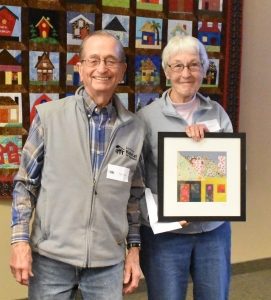
• 20 years – Ken and Carol Deal (pictured, R)
We celebrated staff milestones, too. John Meadows has been a Construction Supervisor for 10 years and Kenny Busch just reached the 15 year mark!
Director of Construction Services Paul Reeves noted that 2016 was a year of change, with multiple staffing changes and four different building sites. None the less, our staff and volunteers rose to the occasion and served the largest number of families to date. 44 Home Repair clients and 14 new homeowners in Buncombe County now have decent and affordable housing.
Looking forward, we’ll be moving to Arden in the early summer to begin a 21-house subdivision, and we’ll be building a Habitat house in McDowell County as part of the SECU Challenge to build or renovate 100 houses in 100 NC counties. Also, we will solidify plans to introduce multi-family housing on a 16-acre parcel in West Asheville that the City of Asheville is helping us secure.
Home Repair Supervisor Joel Johnson thanked his core volunteers, Lonnie Lief and Garland Walker, who have been volunteering consistently for 3 years. Home Repair is unlike new construction in that the scope of work varies from project to project and the jobsite often changes daily. It’s difficult to plan a volunteer calendar in advance, so we appreciate Lonnie and Garland’s flexibility and commitment to the growing Home Repair program.
We were also pleased to be joined by Jeff Staudinger (pictured below), the Community Development D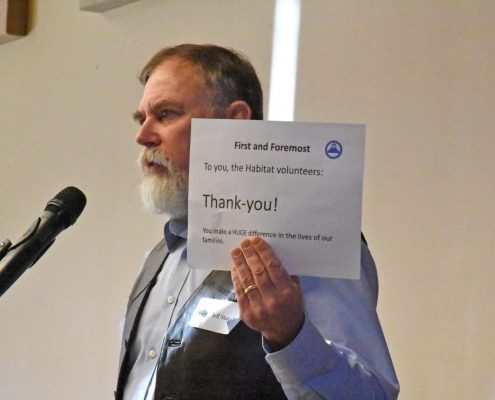 irector for the City of Asheville, who was able to put Habitat’s contributions into the larger affordable housing context. He expressed the City’s enthusiasm for Habitat’s upcoming higher density neighborhood in West Asheville (currently referred to as Cedar Hill). Staudinger also referenced statistics from the Bowen Report and reiterate the City’s commitment to creating new public/private partnerships, and continuing to work to remove barriers, increase density, and strengthen the relationship between housing and transportation. “Shelter is the foundation for everything else,” he noted. “And as Habitat volunteers, you are working directly on the affordable housing crisis.”
irector for the City of Asheville, who was able to put Habitat’s contributions into the larger affordable housing context. He expressed the City’s enthusiasm for Habitat’s upcoming higher density neighborhood in West Asheville (currently referred to as Cedar Hill). Staudinger also referenced statistics from the Bowen Report and reiterate the City’s commitment to creating new public/private partnerships, and continuing to work to remove barriers, increase density, and strengthen the relationship between housing and transportation. “Shelter is the foundation for everything else,” he noted. “And as Habitat volunteers, you are working directly on the affordable housing crisis.”
In closing remarks, Executive Director Andy Barnett reminded the audience, “You are volunteering regularly to build the kind of community you want to live in…you are the hearts, hands and voices of affordable housing. You embody our mission.”
Habitat volunteers build and repair houses – and they build community. They help families build strength, stability and self-reliance. If you would like to be part of the affordable housing solution, click here to learn about Habitat volunteer opportunities.
To see event photos, please click here.
By Andy Barnett, Executive Director
Earlier this week, we observed the Martin Luther King Jr. Holiday. The holiday provides an opportunity to reflect on the legacy of Dr. King and to recommit to a vision of equity for our neighbors who face barriers due to intentionally discriminatory policies and structures of power. Dr. King saw a great deal of progress toward racial equity in his lifetime and we have seen more in the years since his death. But much remains to be done to realize the dream of a nation where everyone has the chance to live up to their potential regardless of where they start from and the obstacles in their path. Continuing this work is our challenge today.
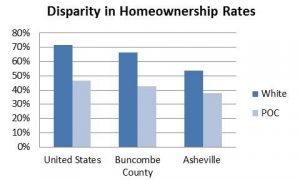
Homeownership Disparity; Source: U.S. Census Bureau, 2011-2015 American Community Survey 5-Year Estimates
One of the places where we haven’t seen progress toward racial equity, where, in fact we see a widening gap between whites and people of color is in household wealth. In 1963, the disparity in median family wealth was about $40,000; white households now have a median net worth $123,000 higher than African American families according to a report by the Urban Institute. This means that white families are much more able to weather financial hardships, take advantage of education and career opportunities, and participate in a virtuous cycle where the wealth attainment of one generation becomes the platform for the next. Families of color are much less likely to see these benefits.
A number of factors contribute to the widening gap in wealth including income, employment, family wealth, and education attainment. But, the largest single factor is homeownership—accounting for more than 25% of the disparity according to a Brandeis study. White households are more likely to own homes. In Buncombe County, 72% of white households own their home while fewer than half of households of color are homeowners. This level of disparity in homeownership is consistent with national homeownership gap. Not only are households of color less likely to own homes, they also build equity more slowly (and lose it more quickly) than white households.
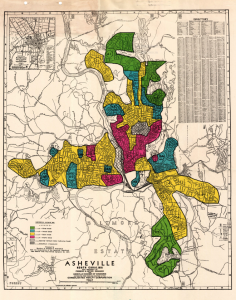
Home Ownership Loan Corporation “redlining” map of Asheville
This disparity is the result of intentional real estate and mortgage lending practices. Beginning in the 1930’s, federal underwriting policy established lending risk based on geography. Communities of color were identified as having a greater risk of default. As a result, these “redlined” areas were largely excluded from the post-war housing boom in housing development finance. Across the country new developments legally excluded Black and Latino buyers through restrictive covenants, and at the same time, neighborhoods of color declined due to lack of capital investment.
This pattern of lending created, in effect, two housing markets. One that rapidly appreciated in value and was restricted to whites, and another for people of color where values and conditions stagnated or declined. Overtime the deteriorating conditions in these disinvested neighborhoods “proved” that race-based lending practices were justified and these neighbors were blamed for the poor conditions rather than recognized as victims of discriminatory practices. Even after housing discrimination based on race was outlawed, “blight” and a “blame the victim” culture made it easy to justify redevelopment and displacement. Unfortunately, two generations of households have missed out on wealth building through a period of historic home value appreciation.
This is where Habitat’s work enters the story. We are a builder and a bank. Our programs simultaneously address geographic disinvestment and create a path to successful homeownership. Habitat develops housing in neighborhoods that other developers might reject, but where opportunities exist for a good quality of life for homeowners. Depending on the market, Habitat’s investment can boost a stagnating market or build long term economic integration in a “hot” market. By financing and assisting repairs for existing homeowners, Habitat preserves the housing stock and adds value to existing neighborhoods. Habitat lends to first time buyers and finances repairs for existing owners that other lenders have determined are too “risky”. Through careful underwriting, extensive education, a focus on partnership with the borrower, and a commitment to affordable mortgage terms, Habitat successfully extends homeownerships to households with incomes well below what it would take to qualify for a conventional mortgage. Since 2010, 45% of those new homeowners were households of color.
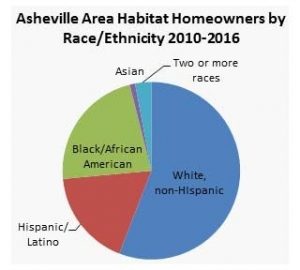 Habitat creates a way for households facing economic barriers to achieve homeownership and begin to close the wealth gap, but we can’t do it alone. To achieve equity in rates of homeownership nearly 3,000 additional households of color in Buncombe County will need the opportunity to become homeowners. To achieve this scale, we will need many more lenders to adopt policies that help households of color overcome historical barriers to mortgage loans. We need to grow housing and financial counseling opportunities to help aspiring homebuyers become “mortgage ready”. We need more affordable rental options and tenant advocacy so that renters have the stability needed to save and prepare for future ownership. Finally, we need home repair and foreclosure prevention assistance to help existing homeowners to remain at home. In short, it will take everyone committing to give our time, our financial support, and our voices to advance the dream of equality of opportunity for all our neighbors regardless of race.
Habitat creates a way for households facing economic barriers to achieve homeownership and begin to close the wealth gap, but we can’t do it alone. To achieve equity in rates of homeownership nearly 3,000 additional households of color in Buncombe County will need the opportunity to become homeowners. To achieve this scale, we will need many more lenders to adopt policies that help households of color overcome historical barriers to mortgage loans. We need to grow housing and financial counseling opportunities to help aspiring homebuyers become “mortgage ready”. We need more affordable rental options and tenant advocacy so that renters have the stability needed to save and prepare for future ownership. Finally, we need home repair and foreclosure prevention assistance to help existing homeowners to remain at home. In short, it will take everyone committing to give our time, our financial support, and our voices to advance the dream of equality of opportunity for all our neighbors regardless of race.
P.S. – On MLK Day, a group of Habitat staff members and volunteers watched this 30 minute film together to gain a better understanding of the complex roots of today’s racial inequity in housing. I encourage you to make the time to watch it.
By Kristen Keefer
Entering into her 23rd year of volunteering at the Asheville ReStore, Susan Diehn remains fresh and energetic in her role. Recruited by a friend, Susan began volunteering at Habitat’s when the store was at its previous downtown location on Biltmore Avenue (pictured there, above L). Within her first year, she was volunteering her time from open to close every Tuesday.
As an experienced volunteer, Susan mentors new volunteers at the ReStore registers. She has held a vital role in helping many volunteers learn the ropes while they become more comfortable assisting shoppers.
For Susan, interacting with customers is one of the highlights of her position. She explained, “We try to be so welcoming to our customers, it’s important. We want their journey to be enjoyable and for them to come back.” Having someone as caring, friendly, and kind as Susan to greet and serve guests is of great value.
The Asheville Habitat ReStore is one of the most successful ReStores in the nation, in part because of dedicated volunteers like Susan.
Her caring personality drives her to serve her community and continues to bring her back to the ReStore. She knows that the livelihood of families, as well as their ability to thrive, begins with a stable place to call home. Because proceeds from the ReStore help fund Habitat’s building programs, her volunteer service directly impacts Habitat’s ability to fulfill its mission. Susan explained while joyfully smiling, “The children just bloom once they have a place to live and a neighborhood to play with other children.”
Susan shared how much she has enjoyed being able to work alongside future Habitat homeowners. Habitat’s homeownership program requires future homeowners to complete “sweat equity” (volunteer) hours, and some of their hours are often completed in the ReStore. Susan described becoming better acquainted with homeowner families as “so special”!
Susan has dedicated much of her time and self to service. In years past, she also served on Asheville Habitat’s Events Committee. And, in addition to her service with Habitat, she was once deeply involved with Interlace, a previously available housing program for women and children experiencing homelessness due to domestic violence.
When asked what aspect of volunteering she found most rewarding, Susan started to reply, “Knowing I’m making a difference” before quickly stopping herself. Following a short pause she continued by saying “I hope I am making a difference. I want to make a difference.”
The impact that Susan has made on the lives of others, both directly and indirectly, is vast and continues to grow week after week and year after year. If there’s one thing that’s certain, it is that Susan Diehn makes a difference in her community- a BIG difference! Thank you, Susan for being such a dedicated, knowledgeable, and giving volunteer. The ReStore is so fortunate to have you on board!
If you’re interested in volunteering, please click here to read about opportunities.
Sorry, no posts matched your criteria
61 Weaver Blvd. Weaverville, NC 28787
828-484-9432
Hours:
Tuesday - Saturday
10am-6pm
GET DIRECTIONS
32 New Heights Drive Asheville, NC 28806
904 Glenn Bridge Rd SE, Arden, NC 28704
